|
1932 | Donald Henry Rumsfeld born in Chicago, Illinois | |
Though he is born in Chicago, Donald Henry Rumsfeld is raised in the North Shore town of Winnetka, an affluent suburb brimming with traditional American family values. His parents, George Donald Rumsfeld, a real estate salesman, and Jeanette, a stay-at-home mom, instill in him a strong work ethic and a voracious reading habit. Even today, he reads widely and works long hours. When Don is eight, his father enlists in the Navy and moves the family all over the country before returning to Winnetka, where Don becomes an Eagle Scout, wrestles on the New Trier High School team, and earns academic and ROTC scholarships to Princeton.
|
 |
1954 | Graduates from Princeton, joins the Navy |
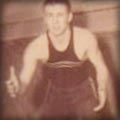
In college, Rumsfeld becomes a champion wrestler and captain of the varsity team. "We were wrestlers on the wrestling team at Princeton," remembers Frank Carlucci, Secretary of Defense for Reagan and Bush." "It's a tough sport because you're out there all alone. And it requires enormous endurance, strength, but most of all quickness and ingenuity … Don had all of those qualities ... He was quite aggressive, quite innovative. Today he thinks outside the box. In wrestling he thought out of the box as well." In 1954, he graduates with a degree in politics and joins the Navy to fulfill the requirements of his ROTC scholarship. While in the Navy, he serves as an aviator and flight instructor and marries his high school sweetheart, Joyce Pierson.
|
 |
1957 | Early years in Washington |
|
After completing his military service in 1957, Rumsfeld transfers to the reserves and moves to Washington to work for a Congressman. In 1960, he returns to Chicago and works at the investment-banking firm of A. G. Becker.
|
 |
1962 | Runs for Congress |
|
When a congressional seat finally opens up in a district in suburban Chicago, Rumsfeld decides to run in the Republican primary and recruits several of his old friends from New Trier High School to help on his campaign. Over the course of his career, Rumsfeld will come to rely on a handful of trusted friends: old high school pals from New Trier, college buddies like Carlucci, and colleagues from his early days on Capitol Hill like Robert Ellsworth, Gerald Ford and Dick Cheney. He will turn to them again and again for jobs and special projects.
Though the odds for winning the election are stacked heavily against him -- even his dad thinks the race is a long shot -- Rumsfeld wins the primary and goes on to take the general election in a landslide.
|
 |
1963 | A First Term Congressman with "sharp elbows" |
|
When he arrives in Congress in the winter of 1963 everybody says of Rumsfeld: "He's a comer. And he has sharp elbows," recalls fellow Congressman Robert Ellsworth."You could tell right away that he was a champion wrestler…by the way he walked and the way he played politics. Very aggressive, very smart, very tough."
Rumsfeld isn't shy and takes several opportunities to mock the reigning Washington bureaucrats. In one instance described by Ellsworth, Rumsfeld loses his patience with government officials who keep describing the jobs they are doing for the government as "in-house" projects. Finally, Rumsfeld asks rhetorically, "What about the out-house?" The committee erupts with laughter. Such no-nonsense bluntness is also popular in his conservative Midwestern district, and Rumsfeld is re-elected to Congress in 1964, 1966 and 1968.
|
 |
1964 | Leads coup in House leadership |
|
Rumsfeld's ambitions are apparent to those who know him in these early years. Ellsworth remembers him as "a potential star. Potential…he had the energy and the intelligence and the physical strength to be a star, potentially." But when Rumsfeld arrives in the House of Representatives in the 1960s, it is unclear how high that star will be allowed to rise: the Republicans have been the minority party in government for over thirty years. Almost immediately, he begins a revolution in the House by leading a group of young Republicans in a coup to replace the House Minority Leader Charles Halleck with a congressman from Michigan, Gerald R. Ford. Ford wins easily and later makes Rumsfeld one of his top advisers. But by this point, says Ellsworth, most congressmen were wary of Rumsfeld, "[he was] very demanding when you make a deal. Better not welch if your deal is with Rumsfeld…He'll speak sharply to you, if nothing else…And [if] you broke a deal, [it would be] difficult to do a deal with him in the future…."
|
 |
1968 | The Nixon Campaign, the Democratic Convention riots |
|
After three terms in Congress, Rumsfeld becomes restless. "He's trying to advance in the House," says James Mann, "[But] that doesn't quite work out because he's got some enemies there." "He was a good legislator, " remembers Ellsworth, "He attended to committee business. He paid attention. He read the research and the reports and knew how to vote and knew how to play the voting in the House floor. But you could see that he lacked a little of the patience that's required -- if I can use that word, 'patience,' -- to be a legislator over an extended period of time. And you could tell that he might make a better executive than he did a legislator, and be more satisfied himself to be an executive."
Rumsfeld angles for a position in a new Republican administration by volunteering for Richard M. Nixon's presidential campaign. His job is to provide the Republican response to the Democrat's platform at the Democratic Convention being held in Chicago, his home turf. But when riots erupt outside the convention, he assumes a more prominent role: providing Nixon with up-to-the-minute reports on the violence in the streets. Though Nixon wins the 1968 election, he doesn't offer Rumsfeld a job in the new administration. "He makes some enemies," explains Mann, "Haldeman [Nixon's Chief of Staff] doesn't like him, and so he doesn't quite get a job." Instead, Rumsfeld returns to the House for a fourth term in 1969.
|
 |
1969 | Director of the Office of Economic Opportunity |
|
Finally, Rumsfeld is offered a job in the Nixon administration (albeit an unlikely one) at the Office of Economic Opportunity (OEO), an anti-poverty agency started by Lyndon Johnson. As director of the OEO, Rumsfeld is expected to lobby for its congressional funding -- funding he had vetoed as a member of Congress. Nixon and his top advisers want Rumsfeld to slowly phase out the OEO, but, "to everyone's surprise, particularly the surprise of other Republican friends of Rumsfeld," says Mann, "he digs in and really pushes hard for the program."
He cuts non-performing projects and works with the states to develop more economically feasible ones. "He saved it, but he saved it by revolutionizing it, by changing it," remembers his deputy director, Frank Carlucci. While at the OEO, Rumsfeld hires a "quiet and unassuming" Capitol Hill intern named Dick Cheney to be his executive assistant, thus beginning a working partnership between the two men that lasts to this day.
|
 |
1971 | White House Adviser |
|
Despite his success at the OEO, Rumsfeld's political future is in danger. "His conservative friends [are] telling him that he had already stayed in the job for too long, and it was becoming a political liability," explains Mann. Rumsfeld leaves the OEO in 1971 to become a special adviser to the president and begins urging Nixon to bring the Vietnam War to a close. Though it may seem surprising in light of his hawkish views toward Iraq, when it came to Vietnam, Rumsfeld was considered a "dove." "[He] could see that we were not figuring out a strategy to win in Vietnam," remembers Ellsworth. "Neither could we figure out a strategy to withdraw. And it was very frustrating."
Rumsfeld never publicly disagrees with the president's Vietnam strategy; nonetheless, Nixon's other advisers, particularly Chief of Staff Bob Haldeman, view Rumsfeld with suspicion. They make sure that his influence in the White House is circumscribed. In a conversation captured on the Nixon Tapes, Haldeman and National Security Adviser Henry Kissinger encourage Nixon to fire Rumsfeld. But Nixon values Rumsfeld's advice, says James Mann, "Rumsfeld was the only guy in the White House that was a politician, and Nixon could identify with someone who had to run for office, who had to take the hits, take the criticism…. And I think Nixon identified with Rumsfeld, the politician."
Also captured on the Nixon Tapes is a series of private talks (listen to the audio) between Nixon and Rumsfeld ranging from American politics to foreign policy to career advice for the young Rumsfeld. One conversation in particular records an ambitious Rumsfeld soliciting better positions within the Administration for everything from special envoy to Vietnam to secretary of commerce. He even suggests to Nixon that he might make a popular replacement for Vice President Spiro Agnew on the 1974 Republican ticket. Instead of taking the bait, Nixon encourages him to gain foreign policy experience in Japan, Russia, China or Europe before seeking higher office. "Latin America doesn't matter," Nixon warns, "…[and]there's nothing you can do about the Middle East." Ironically, Nixon muses that the only cabinet job he doesn't think Rumsfeld is fit for is secretary of defense.
|
 |
1972 | Ambassador to NATO |
|
When Nixon wins re-election, he appoints Rumsfeld ambassador to the North Atlantic Treaty Organization (NATO), an appointment that dramatically changes his political philosophy and the course of his career in politics. It is Rumsfeld's first direct involvement in military and foreign policy, and the formal and unproductive European style of diplomacy aggravates Rumsfeld, pushing him toward more hawkish, action-oriented methods. Mann explains: "It's a very cumbersome process, lots of meetings, sort of endless talk, lots of hand holding…. And Rumsfeld, who had kind of a, 'let's-get-down-to-it, what's-really-important-here,' approach to life, really, constitutionally, is not meant for that kind of diplomacy. Patience is not one of his things."
Though frustrating, his tenure at NATO's headquarters in Brussels keeps him out of Washington during the Watergate Scandal and the impeachment of the president. Many of Rumsfeld's former colleagues and adversaries such as Haldeman and Erlichman are indicted for their participation in the scandal.
|
 |
1974 | Chief of Staff to Ford, end of Vietnam |
|
Rumsfeld's old friend, Gerald Ford, becomes president after Nixon resigns and calls Rumsfeld back from NATO to serve as the chairman of his transition team, and later as his chief of staff. One of the first things Rumsfeld does in the new administration is hire as his assistant his old partner from the OEO, Dick Cheney.
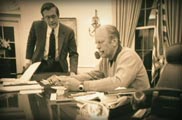
Soon after Ford takes office, he sets about wrapping up America's involvement in Vietnam. During the final hours of the war there is a small crisis: Kissinger's staff tells the press that all Americans have been evacuated from Vietnam, only to learn hours later that the last Americans have only just left. "So they need to sort of tell people, 'Well, now all Americans are out.' [But] how do you do that when you just said that four hours ago?" explains James Mann. "And Kissinger's staff is thinking about, 'Well, maybe we won't say this or maybe we'll fudge it or something.' And Rumsfeld [who] is White House chief of staff, says, 'There have been so many lies during this war. Let's finally tell the truth'."
Under Nixon and Ford, Kissinger is both national security adviser and secretary of state, and his influence over the president's foreign policy is seen as absolute. Says Mann: "Ford really tells his new staff, 'Look, you guys help to put together the domestic side of things, the budgets, everything else. But, really, foreign policy is up to Henry'." However, during 1974, Rumsfeld slowly begins to challenge Kissinger's authority. "It's little things at first," says Mann. "It's paperwork. It's who clears off on the speeches. It's personnel…." By October 1975, in what comes to be known as the "Halloween Massacre," Ford announces a shake up inside his administration: Rumsfeld becomes secretary of defense, Cheney becomes White House chief of staff, and Kissinger loses the job of national security adviser to his deputy, Brent Scowcroft.
|
 |
1975 - 1977 | The youngest secretary of defense in history |
|
When Rumsfeld takes over as secretary of defense, the former dove in the Nixon Administration turns into the Ford Administration's biggest hawk. The American military is badly demoralized by Vietnam and faces a crucial decision: Is it going to restore its forces to pre-Vietnam levels of capability or curtail the scope of the military and focus instead on the diplomacy of dĒtente with the Soviet Union?
Says Thomas White, former secretary of the army: "I thought by the end of Vietnam…[that] we had basically destroyed the United States Army. The non-commissioned officer leadership had vanished and discipline rates were way, way up. We needed just a complete rebuilding of the force from the bottom to the top. And that's precisely what we engaged ourselves in for the next 20 years or so."
Rumsfeld is a proponent of improving U.S. military strength; Secretary of State Kissinger is on the side of détente. During his two years as secretary of defense, Rumsfeld steadily defeats Kissinger on both accounts. Says James Mann: "I think he probably, with one exception, he's probably the most skillful bureaucratic knife fighter that has worked in government for the last half century. That one exception would be Kissinger himself, who, in different ways, was an amazing bureaucratic in-fighter."
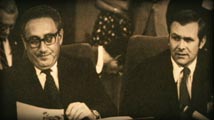
Rumsfeld's first victory comes only weeks after taking office, when he stalls discussion on the upcoming SALT II negotiations Kissinger had been planning with Russia, effectively running Kissinger's arms control agreement into the ground. Later, he convinces a liberal-dominated Congress to increase the 1977 defense budget by $5 billion for military improvements.
One reason Kissinger was defeated by Rumsfeld, says Mann, was that he fundamentally misunderstood Rumsfeld's motivations: "The Kissinger entourage thought Rumsfeld was just tacking. He had been a liberal in the Nixon years. Now [they thought] he was being a hawk because that might help his political standing. Everybody saw Rumsfeld as a political figure, someone who wanted to be President of the United States…. [But] in fact, when Rumsfeld became a hawk in the mid-seventies, he stayed a hawk." Ellsworth claims that Rumsfeld's position on the military was always straightforwardly conservative, in other words "supportive of the military" and "supportive of our position in the world as the counter to the Soviet threat."
Another major issue for Rumsfeld was the effort by members of the Church Committee in the Senate and the Pike Committee in the House to curtail the power of U.S. intelligence agencies: "They were very specific about their effort to destroy American intelligence [capabilities]," remembers Robert Ellsworth. "It was Senator Church who said our intelligence agencies were 'rogue elephants.' They were supposedly out there assassinating people and playing dirty tricks and so forth…. Well, that just wasn't true." Rumsfeld and Ellsworth prevent the committees from dismantling the CIA and other intelligence organizations.
Much of what Rumsfeld is fighting for in his first term as secretary of defense mirrors his efforts in the George W. Bush administration 25 years later. According to Bob Woodward, Rumsfeld's drive for total control when he would return to the office decades later "stemmed from his experience and deep frustration" with his first posting at Defense. "Rumsfeld was secretary for only 14 months…. Only 44 at the time, he had found the Pentagon difficult and almost unmanageable." In an interview with Woodward years later, Rumsfeld will tell him that the job of secretary of defense in the 1970s was too "ambiguous" because there is only "a thin layer of civilian control" at the Pentagon. When Rumsfeld returns to the Pentagon in 2001, he will make sure that this is no longer true.
|
 |
1977 | Rumsfeld leaves government for business |
|
When Gerald Ford loses the 1977 presidential race to Jimmy Carter, the 44-year-old Rumsfeld finds himself suddenly without a job and outside of government for the first time in 20 years. And so, he accepts an offer from his old Illinois friend, Dan Searle to be the new CEO of G.D. Searle & Co., a pharmaceuticals company known for such products as Dramamine, Metamucil and an early birth control pill.
When Rumsfeld took over as CEO of Searle, the company was doing poorly. As he did before at the OEO and later at Defense, he saves the company by changing it from within: he sells poorly performing divisions and decentralizes its headquarters. The year Rumsfeld arrives at Searle, the company was $28 million in the red. When he leaves four years later, it is $120 million in the black. In 1982, Rumsfeld is given stock options in Searle totaling $4 million. When the company is sold three years later, Rumsfeld leaves the company a very wealthy man.
|
 |
1980 | Possible vice-presidential bid |
|
Although he has become a very successful businessman, Rumsfeld does not give up on his old political dreams. After being mentioned throughout the 1980 primaries as a possible vice-presidential candidate, an interesting thing happens. Republican nominee Ronald Reagan tries to put together a "dream ticket" by asking former President Ford to be his running mate. When the deal collapses at the eleventh hour, "the Reagan Administration [sic] puts itself in a position where...they've got to come up with someone in hours," says Mann.
And at that point, Richard Allen, one of Reagan's advisers, pushes hard for George Bush, the former director of the CIA, who ran against Reagan in the Republican primaries. "Within the course of about an hour or two," says Mann, "Reagan picks up the phone and calls George Bush, who is thrilled and a little surprised and offers him the vice-presidential nomination. But Rumsfeld, who is actually more in-line with Reagan's political ideology, gets left out of this equation. According to Mann, "At one point [Rumsfeld] asks his old friend, Richard Allen, 'You know, why didn't they call me'?" According to Mann, Allen jokes, 'Well, I happened to have Bush's number in my phone book and I didn't have yours."
|
 |
1980s | Continuity of government exercises |
|
After Reagan is inaugurated in 1981, Rumsfeld, and his old partner Dick Cheney, now a republican congressman from Wyoming, begin participating in the Reagan administrations's covert continuity of government exercises. Once a year, for every year during the 80s, Rumsfeld and Cheney, along with dozens of other federal officials including George H.W. Bush, are whisked away in the middle of the night to remote locations around the country simulating America's response if its governmental leadership is "decapitated" by a Soviet nuclear attack. The program circumvents the constitution and is legally questionable.
Later, the Clinton administration will abandon these exercises; however, on Sept. 11, 2001, when the nation finds itself under attack by terrorists, the plan is reactivated. While Cheney and Rumsfeld remain in secure locations in Washington, other important cabinet offices are evacuated to the same undisclosed bunkers around the country where Rumsfeld and Cheney had played out this scenario years earlier.
|
 |
1983 | Reagan names Rumsfeld his "Personal Representative to the Middle East" |
|
In December 1983, Rumsfeld travels to Iraq as Reagan's personal representative "looking for openings for new American diplomacy." He is the first senior U.S. official to visit in more than six years. He meets with Deputy Prime Minister Tariq Aziz and Iraqi President Saddam Hussein (watch the video) and makes clear to them that the US policy in the region is to contain Iran (then at war with Iraq) and the spread of Islamic fundamentalism.
Despite knowing that Iraq had used nerve gas on the Iranians in the Iran-Iraq War, U.S. officials decide to look the other way, says Washington Post military correspondent Dana Priest, because, "we thought that was the right thing to do in terms of our own national security." Robin Wright, another Post reporter, tells FRONTLINE that the U.S. played an important role in helping Iraq win the war against Iran: "We provided intelligence to the Iraqis, satellite images of where Iranian troops were deployed, that allowed Saddam Hussein to know where and how to target. And in some of those operations, his forces used chemical weapons…. And in one case, involving a major offensive in Iraq eventually launched, we helped effectively plan it."
In yet another mixed message about U.S. relations with Iraq, Rumsfeld promises Saddam in 1983 that the U.S. will tell its allies to stop selling arms to Iran. He could not have known that only months later, other members of the Reagan Administrations will begin planning the Iran-Contra Affair, in which the U.S. will sell arms to Iran and use the proceeds to fund the anti-leftist Contras in Nicaragua. But before then, Rumsfeld will resign as Middle East envoy, feeling that peace in the Middle East is unattainable.
|
 |
1985 - 1988 | A career in private business |
|
After leaving Searle in 1985, Rumsfeld goes into private business: making investments for himself and advising other entrepreneurs. Then in 1986, he considers a run for president. Rumsfeld receives the support of important political figures such as George Shultz and his old Princeton buddy, National Security Adviser Frank Carlucci; but his candidacy does not resonate with the public, and he finds it difficult to raise the necessary funds to run a campaign. "Later on he called me," says Carlucci, "to tell me that he found the fundraising too difficult, and he was going to drop his candidacy." When Bush wins the 1988 election, he appointments Dick Cheney, Rumsfeld's old protĒgĒ to be his secretary of defense.
|
 |
1990 - 2000 | Chairman of the board, again |
|
From 1990 to 1993, Rumsfeld serves as chairman and CEO of General Instruments Corporation, a leader in broadband transmission, distribution, and access control technologies. When the first Gulf War occurs in 1991, Rumsfeld watches from the sidelines. After leaving General Instrument, and before returning to the Department of Defense, Rumsfeld serves as chairman of the board of Gilead Sciences, Inc., a pharmaceutical company. During the mid- to late 1990s, Rumsfeld joins several influential government boards and commissions, gradually working his way back into government.
|
 |
1995 - 1996 | Adviser to the Dole presidential campaign |
|
While working at Gilead, Rumsfeld volunteers two days as week as a foreign policy adviser to Bob Dole. The campaign's other foreign policy adviser is Paul Wolfowitz. "So you get the alignment that now runs the Defense Department - Rumsfeld and Wolfowitz - as the key foreign policy people in the Dole campaign," says James Mann. " A lot of positions that Dole takes on foreign policy, during the '96 campaign -- missile defense, North Korea -- are ones that [George W.] Bush will take later on." By the end of the campaign, Rumsfeld will be working six days a week as Dole's national campaign chairman. |
 |
1997 | The Rumsfeld Commission |
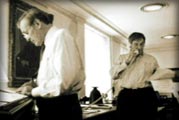
In 1997, Congress creates a commission to investigate U.S. intelligence reports concerning ballistic missile threats and names Don Rumsfeld its chairman. One of the nine members of the commission is Paul Wolfowitz, who had worked with Rumsfeld on the Dole campaign and on Plan B, a missile commission that studied Soviet Power in the 1970s, when Rumsfeld was secretary of defense.
The Rumsfeld Commission's report, released in July 1998, finds that the risk of a missile attack against the U.S. is greater than the intelligence agencies had reported. The report claims that some countries will be able to "inflict major destruction" on the U.S. within five years of deciding to do so. It goes on to name three countries in particular - Iran, Iraq and North Korea - as the countries most dangerous to U.S. safety because they appear to be developing nuclear weapons.
|
 |
1998 | The Congressional Policy Advisory Board |
|
When the Republicans lose the 1996 presidential election, former Speaker of the House Newt Gingrich and key members of the future Bush administration form the Congressional Policy Advisory Board, where leading conservative thinkers can meet with Republican members of Congress to develop domestic and foreign policy, possible legislation, and critiques of the Clinton administration. Don Rumsfeld, along with Dick Cheney and Paul Wolfowitz, are some of its most active members. Condoleezza Rice is a late addition to the group. Noticeably absent from the board are Colin Powell and Richard Armitage.
|
 |
Early 1998 | Letter to President Clinton |
|
On Jan. 26, 1998, the Project for a New American Century, a conservative think tank based in Washington, makes public a letter to President Clinton calling for the removal of Saddam Hussein from power. It is signed by 18 people, among them prominent members of the future Bush administration: Paul Wolfowitz, Richard Armitage, Richard Perle and Don Rumsfeld.
In what is no doubt a response to public pressure created by the letter, President Clinton signs a bill in late-1998 authorizing up to $97 million to Iraqi opposition forces "to remove the regime headed by Saddam Hussein" and "promote the emergence of a democratic government." "Though not widely understood," writes Bob Woodward, in his book Plan of Attack, "the baseline policy was clearly 'regime change'."
|
 |
1999 - 2000 | The George W. Bush campaign and "missile defense" |
|
While working as a foreign policy adviser to the Bush campaign, Rumsfeld devotes his attention to a single issue: missile defense. It has only been a few years since he chaired the congressional commission that identified serious threats from several countries with missile capabilities, and he has recently chaired the U.S. Commission to Assess National Security Space Management and Organization, whose primary purpose was the assessment of a viable national missile defense system. It is not surprising, then, that missile defense becomes one of the major tenets of the Bush campaign's foreign policy as well as Rumsfeld's immediate preoccupation when he becomes secretary of defense in 2001.
|
 |
2001 | A new administration |
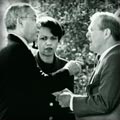
George W. Bush's first cabinet appointment after becoming president is Colin Powell as secretary of state. Powell's appointment, more than anything else, determines that Donald Rumsfeld will be named secretary of defense. Because Powell is a moderate on many important issues and somewhat of a dove on defense, neo-conservatives both inside and outside of the administration seek to curtail his influence. "'You begin to get a very quiet ground swell," says James Mann, "[that] 'we need a strong secretary of defense who will keep Colin Powell in check. Make sure he's not running the Pentagon as well as the State Department'." Among the other members of Bush's senior foreign policy team, Condoleezza Rice has already been promised the job of national security adviser, and neither Paul Wolfowitz nor Richard Armitage have the experience for such a senior position. That leaves only Don Rumsfeld.
In late December 2000, several national newspapers report that Rumsfeld will be named CIA director. With his previous experience on the 1997 congressional intelligence commission, he seems a clear choice, writes James Mann. But privately, says Mann, "Rumsfeld himself wasn't sure he wanted the job." Then on Dec. 28, the president announces his decision to appoint Rumsfeld as secretary of defense for the second time in his career. "The Pentagon is kind of looking forward to the Bush administration," Washington Post reporter Thomas Ricks tells FRONTLINE, "there's a lot of buying into phrases like, 'We'll have adults running the place again'."
|
 |
January - August 2001 | Transforming the Pentagon |
|
Immediately after taking office, Rumsfeld begins to reassert civilian control over the Pentagon, a department that had been run by the uniform military in recent years. "It was a pretty tough process," says Thomas Ricks, "A lot of friction in those first months, with Rumsfeld saying, 'No, I don't think you heard me clearly. I'm the boss. I want to do it this way'." He undertakes an exhaustive review of all of the military's contingency plans and personally interviews candidates for promotion at the highest levels. Says Ricks, "[There was] a lot of resentment of that in the military."
Rumsfeld's close inspection of the Defense Department leads him to initiate what is known as the Revolution in Military Affairs (RMA), an overall transformation of how the military is organized and managed. John Arquilla, a professor at the Naval Postgraduate Schools explains: "Donald Rumsfeld wanted to build a smaller, nimbler and more networked military that could respond swiftly to threats anywhere in the world." But military leaders inside the Pentagon feel attacked, says former Secretary of the Army Thomas White, "All of a sudden the view of the army becomes 'Well, they're stodgy. They're intransigent, and they don't understand. They don't get it, what all this stuff is all about."
A rift forms between the civilian and military leadership at the Pentagon with Rumsfeld on one side, convinced that the Pentagon bureaucracy is blocking innovation, and the uniformed military on the other side, wary of a renegade boss who has recently involved himself in personnel decisions. Meanwhile, Rumsfeld does not get the budgetary support he needs for transformation because the White House is busy trying to push its tax cut measures through Congress; so, he appears ineffectual as well as unpopular. "There are a lot of people who aren't anxious for Don Rumsfeld to succeed at this point in time," says Andrew Krepinevich, a member of the National Defense Panel. "And of course, inside the Beltway, there are all these discussions about, 'Well, who's going to be the first Cabinet Secretary to leave this Administration?'…And the early betting line is it could be Don Rumsfeld." But then on Sept. 11 that changes.
|
 |
Sept. 11, 2001 | A new mission |
|
When a terrorist-hijacked plane plows into the Pentagon on the morning of Sept. 11, Secretary Rumsfeld is sitting inside in a meeting. Immediately after evacuating the building, he begins to help rescue those injured. "He runs toward it," says former Deputy Secretary of Defense John Hamre. "It is, again, his instinct. That's what he does. He runs in to a problem. He doesn't run from a problem." "That certainly earns him a big gold star, I think, in terms of the uniformed military; personal courage counts for a lot," says Andrew Krepinevich.
Afterward, Rumsfeld heads back inside the Pentagon to the National Military Command Center, where he remains in contact with the president and vice president throughout the day. Rumsfeld and Cheney argue that the U.S. will have to retaliate -- not just against bin Laden, but against countries who may have helped him, maybe even Iraq. Later that night at a meeting of the president and his cabinet, says Bob Woodward, "Rumsfeld actually puts Iraq on the table and says, 'Part of our response maybe should be attacking Iraq. It's an opportunity.' So he was the first to mention it."
Discussion of attacking Iraq is tabled - temporarily; instead, the U.S. will go after the bin Laden-backed Taliban regime in Afghanistan. But the attacks against the U.S. prove to Rumsfeld that more than ever, transforming the military is a necessity.
For more on Rumsfeld's vision of military transformation, read "Transforming the Military" by Rumsfeld published in the May/June 2002 issue of Foreign Affairs.
|
 |
Oct. 7, 2001 | "Operation Enduring Freedom" begins in Afghanistan |
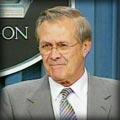
Less than a month after the 9/11 attacks, about 100 CIA paramilitary officers arrive in Afghanistan as part of a covert war plan developed by the CIA. Temporarily, Rumsfeld and the U.S. Army are sidelined because the Joint Chiefs have given Rumsfeld a war plan for Afghanistan that would take too long to execute and would employ too many ground troops. The CIA's plan, on the other hand is creative, light and nimble -- and seems the epitome of military "transformation."
Although the Army is out, Rumsfeld manages to get Special Forces included in the war plan. And he reasserts his power by giving daily, televised press conferences about the war's progress. The secretary's straightforwardness, along with his personal charm, makes him a temporary media celebrity. The briefings also make clear that Rumsfeld, not the uniformed military, is in charge. "You see the contrast to the first Gulf War," says James Mann. "This time the secretary of defense is the guy at the podium and the chairman of the Joint Chiefs is the guy who is kind of in uniform, sort of standing behind nodding. But Rumsfeld is the driving force."
Explore FRONTLINE's full report on the 2001 Afghanistan war - "Campaign Against Terror." It includes maps, background on key battles and interviews with Special Operations forces.)
|
 |
November 2001 | Redrawing plans for war in Iraq |
|
Even as the war in Afghanistan continues, the president's cabinet begins looking at possible military action against other countries. Since the previous winter, Rumsfeld has been personally redrafting all of America's contingency plans, which he feels are out-of-date, including the plan for invading Iraq. When President Bush asks Rumsfeld just before Thanksgiving 2001 to secretly begin drawing up a new war plan for Iraq, Rumsfeld is prepared.
|
 |
January - September 2002 | "Pre-emption," the new defense strategy |
|
Beginning with the president's State of the Union Address in January 2002 and culminating with the release of the new National Security Strategy in September 2002, the Bush administration begins laying out a new hardline foreign policy, known as the Bush Doctrine. Its centerpiece is the policy of pre-emptive action. Rumsfeld explains the new policy in a January 2002 speech: "Defending against terrorism and other emerging 21st century threats requires that we take the war to the enemy. The best and in some cases the only defense is a good offense."
Read FRONTLINE'S chronology tracking the evolution of the Bush Doctrine, from "The War Behind Closed Doors" report.
|
 |
February 2003 | Battle over force size |
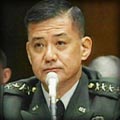
As the military mobilizes for a war in Iraq, the internal debate being waged in the Pentagon over troop size becomes public. Army Chief of Staff Gen. Eric Shinseki testifies before the Senate Armed Services Committee that he believes at least "several hundred thousand troops" are necessary to remove Hussein and secure Iraq. But the Pentagon civilian hawks, including Rumsfeld and Wolfowitz, think the number needed could be far lower and they try to discredit Shinseki. Ultimately, the war plan calls for 140,000 troops, a number between the two opposing estimates.
|
 |
March 2003 | Operation Iraqi Freedom |
|
On Mar. 19, the U.S. invades Iraq; three weeks later, Baghdad falls. "I think the plan was less transformational and daring than Rumsfeld hoped it would be," says Thomas Ricks, "It was a hybrid. It was a lot of the old and some of the new, probably more of the old than Rumsfeld would like to acknowledge."
|
 |
May 2003 | War's aftermath |
|
The president declares "major hostilities" over on May 1, 2003, but it quickly becomes evident that the post-war planning to secure the country is woefully inadequate and mishandled. Months earlier Rumsfeld had lobbied the president for control over post-war reconstruction and Defense won the job. "This is typical Don Rumsfeld," explains John Hamre. "He said, 'You can hold me 100 percent accountable for this, but you have to give me 100 percent of the responsibility as well. Let me run the thing and you can hold me completely accountable." But as it turns out, Andrew Krepinevich explains, "Rumsfeld, in terms of his temperament and his personality, seems to be much better suited to be a secretary of war than a secretary of defense." One of the many controversial decisions made in the immediate post-war period is the disbanding of the Iraqi Army, putting 400,000 Iraqi men out of work and leaving the stretched U.S. military to handle security and reconstruction on its own.
|
 |
2004 | Abu Ghraib and a growing insurgency |
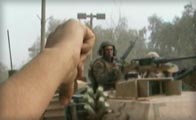
In April 2004, Seymour Hersh and CBS break the story on the shocking abuse of Iraqi detainees at the Abu Ghraib prison. There are calls for Rumsfeld's resignation, even his removal. Then in August 2004, two former Secretaries of Defense, James Schlessinger and Harold Brown, weigh in. Their report on Abu Ghraib finds that circulated policy memos indirectly led to some of the nonviolent and nonsexual abuse at Abu Ghraib. "I think he must have been a little surprised when he read the Schlesinger report to see his peers, a couple of former Secretaries of Defense, weigh against him and find him wanting," says the Washington Post's Thomas Ricks. "…But the report was broader than that. It faulted the entire handling of Iraq in that crucial period as the insurgency developed and developed into a full-blown opposition to the U.S. presence in Iraq."
By the autumn of 2004, 135,000 U.S. troops remain in Iraq. The initial uncontrolled looting and widespread civil unrest that erupted soon after the spring 2003 invasion has now spawned a large insurgency against coalition forces and the U.S.-backed Iraqi government. With mounting casualties in Iraq and without a clear exit strategy in either Iraq or Afghanistan, Rumsfeld's critics charge the secretary has pushed too far. The danger, they say, is a military incapable of effectively fighting the next major conflict.
|

· · ·
A Note On Sources: This chronology is drawn from FRONTLINE research and reporting, and the following books and articles:
Duffy, Michael and Mark Thompson, "Secretary of War," TIME, 29 December 2003/ 5 January 2004.
Mann, James. The Rise of the Vulcans: The History of Bush's War Cabinet. New York: Viking, 2004.
Scarborough, Rowan. Rumsfeld's War: The Untold Story of America's Anti-Terrorism Commander. Washington: Regnery, 2004.
Woodward, Bob. Plan of Attack. New York: Simon and Schuster, 2004.
| |